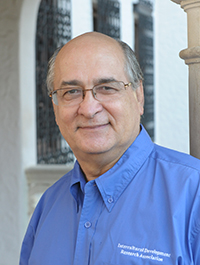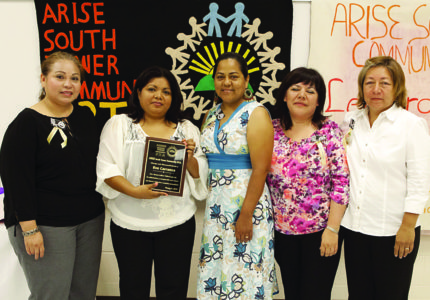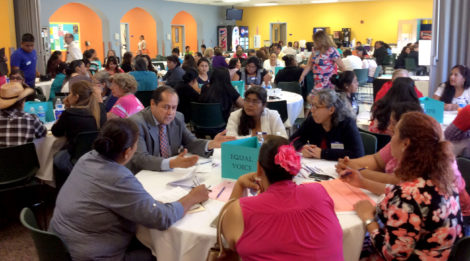by Aurelio M. Montemayor, M.Ed., IDRA Newsletter, May 2017


An Education CAFE (Community Action Forums for Excellence) is a parent group that is rooted in a community-based organization, rather than in a single school. Its sole purpose is to collaborate with schools to improve the success of students in the community. With the new W.K. Kellogg Foundation funding, this empirical model developed by IDRA will be taken to these four geographic areas with urban populations of varied ethnic backgrounds and economic classes.
IDRA’s Family Leadership in Education principles assert that families are the strongest long-term advocates for quality public education. When families are treated with the dignity and respect they deserve, their leadership can lead to transformational change that benefits all children.
Innovative from the Start
“What are our dreams and aspirations for the education of our children?” “What critical information is available on their education in our schools?” “What can we do together to improve our schools?” The answers families give to these questions form the essential pieces of an Education CAFE (formerly called Comunitario PTAs).


Third anniversary of the ARISE PTA Comunitario (left to right): Lourdes Flores (ARISE Support Center), Eva Carranza (ARISE South Tower), Andrea Landeros (ARISE Muñiz), Emilia Vega (ARISE South Tower), Andrea Olvera (ARISE Las Milpas) in 2012
A number of years ago, this vision took shape in new and powerful ways in the Texas Valley. At the invitation of Sr. Gerrie Noughton, founder of a grassroots organization called ARISE, we began conducting training with families in several colonias (unincorporated small communities). Soon, there were teams of mothers visiting their children’s schools to investigate, for example, why the majority of the students were failing the state math test. As our relationship continued, a youth leadership group, the ARISE Tekies, was formed to assist in bridging local families with computers and technology.
In the summer of 2010 in an event called ¡Ya Es Tiempo!, IDRA convened families to examine school data in collaboration with ARISE and other community organizations (IDRA, 2010). Soon after, IDRA’s first model Comunitario PTA site was born at ARISE with Lourdes Flores’ leadership – making it the first Comunitario PTA in the nation (Montemayor, 2010). Later, we brought together a larger representation of families, communities and educational institutions in McAllen, Texas, in the first Mesa Comunitaria (see box on Page 7) (IDRA, 2016).
Along with these successes, in late 2012, IDRA was selected by the U.S. Department of Education to research and expand IDRA’s model in five communities in South Texas, through the i3 Initiative. By the end of the grant period, there were eight Comunitarios that collaborated across communities on several education leadership projects – and that number continues to grow.
See a video on communities using data
The groups now include two sponsored by ARISE in South Tower (south of Alamo) and Las Milpas in south Pharr. In Brownsville, Proyecto Juan Diego continues is in its seventh year and, across town, Mano a Mano is sponsoring four groups. Vida Digna continues to have two groups: one in San Benito and another in Los Fresnos.
Comunitarios have multiplied their membership and actively coach other groups interested in starting a similar organization. The Equal Voice Network in south Texas facilitated the expansion and now monitors, guides and supports the activities and projects through its Education Working Group.
Education CAFE Expansion
The new name unveiled in January, Education CAFE, emphasizes the diversity of communities who are engaged in impacting their public schools. By establishing Education CAFEs in community-based organizations, communities can leverage existing local assets and networks to foster a sustainable base of family engagement from kindergarten through high school. Three components are central to the Education CAFE approach as follows.
Community-based, Distributive Leadership – Education CAFEs are born in their communities. They are connected to a local organization that commits to focus on education (among its other mission areas). Meetings are attended by parents, grandparents, students’ older siblings, neighbors and all who consider themselves custodians of children’s academic success and future. By rotating leadership roles, the Education CAFE is not dependent on a central charismatic leader, and instead is based on a distributive leadership model.
School Partnerships – Education CAFE members come together and partner with schools in their neighborhood to ensure student success. Collaboration includes co-planning and sharing responsibility for outreach and ongoing activities that improve education in their neighborhood public schools.
Education Projects – Education CAFEs carry out education projects using actionable data (see story on Page 5). For example, they bring families together to examine education policies and their implications for children’s access to advanced placement, dual credit and pre-algebra courses; the state’s education budget; and college readiness strategies. They also meet with school administrators to dialogue about shared concerns.
See Steps on How to Start an Education CAFE
Today there are hundreds of Education CAFE families in multiple areas working with school leaders to monitor the academic success of their children and other neighborhood children. Each has its own unique characteristics and family leadership in education projects, but they all are connected and collaborate in area-wide projects. Some group projects have included campus visitations to introduce the new organization, open hearings with school board candidatebudurl.com/IDRAECstepss, large public events to protest cuts to the state education budget, and surveys about how new graduation plans are being implemented and their impact on poor and minority students.
In 2015, they conducted a bilingual survey totaling more than 1,600 families in their neighborhoods (Cortez, 2015). The results were presented to the larger community in August of 2015. Now families are conducting a follow-up survey to assess whether there has been any improvement or if conditions have remained the same.
As IDRA rolls out the plan for statewide expansion of its Family Leadership in Education model, we will continue to support and inform these established groups. Each year, there has been a presentation from one or several of the groups at the Annual IDRA La Semana del Niño Parent Institute™. This year, they co-presented in San Antonio with a live-stream two-way session that focused on the work of the Equal Voice Education Working Group.
A common theme for education projects in the Texas Education CAFE Network will be the federal education law, ESSA, which gives parents and communities the opportunity to be more directly involved in children’s education. ESSA specifically calls for state education plans developed in consultation with parents and involvement of parents in creating state report cards, and for Title I school districts (those with high percentages of households below the poverty line) ESSA requires direct parent outreach, school-parent compacts and at least 1 percent of Title I funding reserved for family engagement.
As Lourdes said: “If a group of parents can raise $5,000 for this campus, OK. But if a group of parents can join together to make sure the math scores go up, this school will benefit much more. They might not know how to do algebra but they know it’s important.”
The dreams and aspirations for the education of all children are the driving force for these groups. Having access to actionable school data deepens their understanding and informs their actions. Families, through their collective leadership and projects like the Texas Education CAFE Network, can change and transform schools for the better. For more information on the IDRA Education CAFE model, contact IDRA at contact@idra.org.
Resources
Cortez, J.D. (June-July 2015) ¿Y Ahora Qué? And Now What? – Community Groups in South Texas Work Together to Improve Education,” IDRA Newsletter (San Anotnio, Texas: Intercultural Development Research Association).
IDRA. (2016). Our Mesa Comunitaria – One Year Later (San Antonio, Texas: Intercultural Development Research Association).
IDRA. (August 2010). “¡YA Es! Tiempo Event Highlights – Securing Educational Excellence and Equity for All Students in the Rio Grande Valley of Texas,” IDRA Newsletter (San Antonio, Texas: Intercultural Development Research Association).
Montemayor, A.M. (April 2010) “ARISE South Tower PTA Comunitario – A New Model of Parent Engagement,” IDRA Newsletter (San Anotnio, Texas: Intercultural Development Research Association).
Aurelio M. Montemayor, M.Ed., is an IDRA senior education associate and directs the IDRA Texas Education CAFE Network project. Comments and questions may be directed to him via email at aurelio.montemayor@idra.org.
Established IDRA Education CAFEs to Date


- ARISE Cesar Chavez in Las Milpas/South Pharr
- ARISE South Tower in South Alamo/Donna
- BCHC Mano a Mano Galaxy in Brownsville
- BCHC Mano a Mano Southmost in Brownsville (plus two more in development)
- Proyecto Desarollo Humano in Peñitas /La Joya
- Proyecto Juan Diego in Brownsville
- RGV La Raiz in San Benito
- RGV La Raiz in Los Fresnos
All of the groups collaborate with the Rio Grande Equal Voice Network. They convened “Mesa Comunitaria” events where community leaders, school superintendents, college and university leaders and others gathered to consider possible collaborative actions in response to drastic changes in Texas’ education policies.
The meetings were planned for maximum participation and critical conversations. At the second event, after a brief presentation of the findings of the community survey on awareness of new graduation requirements, small groups heard testimony from a community member who had some experience in dealing with the schools on the two issues: information about graduation requirements and ensuring that their children were taking the requisite courses for college preparation. After the Mesa Comunitaria, the Education Working Group met monthly to monitor the follow-up. All the plans of action were documented and distributed to representatives of all the participating groups and collaboration with schools continued.
[©2017, IDRA. This article originally appeared in the May 2017 IDRA Newsletter by the Intercultural Development Research Association. Permission to reproduce this article is granted provided the article is reprinted in its entirety and proper credit is given to IDRA and the author.]


